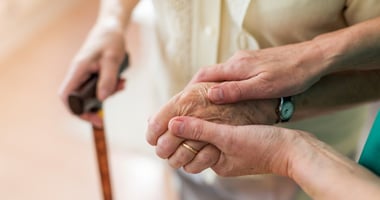While the long-term use of most antidepressants does not appear to increase the risk of dementia,...
Walking Daily Linked to Lower Dementia Risk, but How Many Steps Does It Take?

Walking roughly 9,800 steps a day may lower the risk of developing dementia within seven years by 50%, a study in JAMA Neurology has found. However, the study also suggests that adults need not walk that far to derive protective benefits: Walking approximately 3,800 steps a day may lower the risk of dementia by 25%. Furthermore, the study found a link between higher-intensity walking and lower risk, and that steps taken at peak intensity need not be taken all at once to help lower risk.
Borja del Pozo Cruz, Ph.D., of the University of Southern Denmark and colleagues examined data from 78,430 adults aged 40 to 79 years who were part of the UK Biobank study, which contains in-depth genetic and health information from 500,000 participants in the United Kingdom. Participants wore an accelerometer on their wrists for at least three consecutive days between February 2013 and December 2015 to track their physical activity, including their daily number of steps. The researchers categorized step intensity three ways: They defined incidental steps as less than 40 steps a minute, such as indoor walking from one room to another; purposeful steps as 40 or more steps a minute, such as steps taken while exercising; and peak 30-minute cadence as the average number of steps a minute recorded for the 30 highest, but not necessarily consecutive, minutes in a day. The researchers then tracked the participants until October 2021 to determine the rate of dementia.
During the follow-up period of about seven years, 866 participants developed dementia, the researchers reported. Del Pozo Cruz and colleagues found that the optimal number of incidental steps a day was 3,677, which lowered risk by 42%. The optimal number of purposeful steps was 6,315, which lowered risk by 57%. For peak 30-minute cadence, the optimal dose was 112 steps a minute, which lowered risk 62%.
“Step count–based recommendations have the advantage of being easy to communicate, interpret, and measure, and may be particularly relevant for people who accumulate their physical activity in an unstructured manner,” the researchers wrote. “Future guidelines for dementia prevention may capitalize on the results of this study to promote step-based recommendations.”
For related information, see the Psychiatric News Alert “Worsening Memory, Slowing Gait Associated With Increased Risk of Dementia.”
(Image: iStock/VTT Studio)
Don't miss out! To learn about newly posted articles in Psychiatric News, please sign up here.






